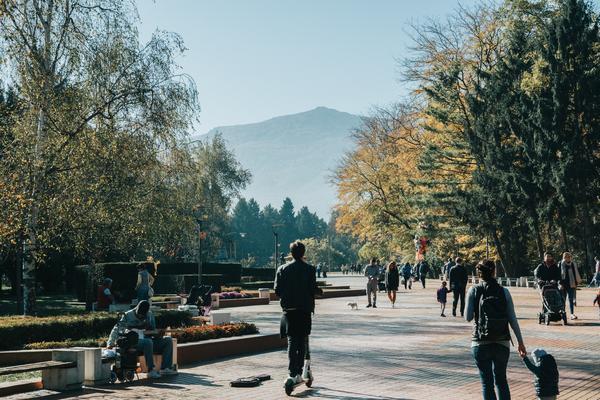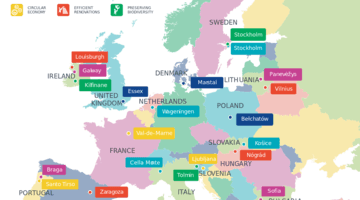Sofia (Bulgaria)
The local experiment will explore the current mobility habits of students in three schools, located in three different districts of the city. During the experiment, the team will be exploring how the surroundings around the school can be improved to make it easier for students to adopt more sustainable options to travel to school rather than being driven by their parents. Furthermore, it will evaluate the need for introducing school bus lines for the schools located in the city centre and address behavioral change among parents and students.
Local context
Sofia, the capital of Bulgaria, has a high percentage of car use (around 39%) and almost 60% of the children are being driven to school by their parents. The bike lane infrastructure in the city is currently not very well developed, thus most of the schools don’t have any bike lanes nearby, and bicycle parking is not common yet. Currently, there are limited options for school buses or other sustainable mobility initiatives for school children. However, recently the SofiaGREEN team has been involved in the implementation of school buses in two schools and a pilot "Walk to School" initiative, amongst others.
Specific needs and challenges
The experiment will face some challenges mainly due to the mayoral elections in Bulgaria in October 2023 and the long summer break of the schools (mid-June – mid-September). Therefore, the partners will work closely with experts and school administration to keep a clear and straightforward planning. A second challenge may be the engagement of the schools' administration. For this, the experiment will identify active and engaged teachers from the start of the activities. Thirdly, the long vacation times of the students may cause a problem for the continuity of communication. To overcome this challenge, a clear timeframe will be discussed with all participants at the beginning of the project.
Detailed description of the experiment
Sofia is one of the European cities with the highest motorization rate – more than 550 cars/1,000 people, also one of the cities with the oldest average car age – 16 years. Also, Sofia is struggling with air pollution mainly caused by the above-mentioned factors but also because of the geographical position of the city - located in a valley, surrounded by high mountains preventing natural air flow, increasing the smog and fog, especially during wintertime. With this experiment, we aim to initiate behavioral change among the younger population and raise awareness of how traffic and the use of individual cars to commute on a daily basis affects the environment. During the experiment, the team aims for three main achievements:
- Motivate students and their parents to think carefully before deciding to get in their car in the morning to move around the city
- Come up with ideas and suggestions on how to improve the schools' surroundings in order to motivate students and their parents to move sustainably
- Gather ideas and build on the existing school bus service and onboard new schools that are willing to be added. Also, if there is such interest and needs, we can also explore the readiness of the society and the possibility of introducing school streets and more pedestrian areas around the schools.
Moreover, we want to also improve the knowledge of the students on air quality, the correlation between air pollution and mobility, and the solutions that sustainable mobility may provide using co-creation methods and hearing the voice of young people about the ways to improve urban mobility and their daily commuting.
Local engagement
Students (10-13 years old, from 4th to 6th grade), building a strong and active community of students to explore their habits and needs.
School management and teaching staff - important stakeholders that will help us manage the project, involving the other stakeholders and informing the school community about the different stages and outputs.
Parents - they are the ones who make decisions about how their child will go to school. They could be reached via surveys on a larger scale and more actively via parents' boards.
Transport Department of Sofia Municipality - to discuss with them the proposed solutions and any infrastructure interventions (if needed).
Partners
The experiment is working closely with the Transport Department of Sofia Municipality on the pilot project of implementing school buses in two of the largest schools in Sofia. The experiment activities and the proposed solutions and ideas will be coordinated with the Transport Department to check the possibility of extending the school bus project and involve more schools, and co-create more routes for them.
Additional remarks
The results from the project will help to accomplish 3 goals the team has set:
- Increase the level of awareness of children on air quality issues and how traffic relates to that, leading to opportunities for identification of behavioral changes that will help tackle this issue.
- Engaging with students will provide us with the opportunity to reach out to their parents who might reconsider their mobility habits towards more sustainable ones.
- We will provide policymakers with solutions based on data to support their decisions concerning improvement of public mobility services, introduction of low emission zones and on-demand public transport options, innovative approaches to limit the traffic in the city centre, etc.
Local partner
Sofia Development Association (SDA), project SOfiaGREEN
Country
Bulgaria
Number of inhabitants
1,276,956
City
Sofia
Website/social media
Contact person:
Desislava Todorova, Project Specialistinfo [at] sofiagreen [dot] bg
May-Jun 2023
Youth Mobility Check Forum
Jun-Jul 2023
Synthesis Forum
Sep-Oct 2023
Fields of Action Forum
Sep-Oct 2023
Youth Mobility Policy Forum
Oct 2023
Study Tour (Sofia)
Oct-Nov 2023
Youth Design Forum I
Nov-Dec 2023
Youth Design Forum II
Jan-Feb 2024
Final Forum
Related Green Deal Priorities


CONTACT
For further details please contact co-leads Professor Chris Foulds (chris.foulds@aru.ac.uk) and Professor Rosie Robison (rosie.robison@aru.ac.uk).

This project has received funding from the European Union’s Horizon 2020 research and innovation program under grant agreement No 101036640. The sole responsibility for the content of this website lies with the SHARED GREEN DEAL HAS project and does not necessarily reflect the opinion of the European Union.

